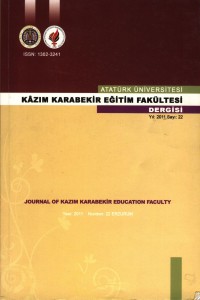"I;IGIRJNDAN I;IKMI~ ~iMDi"DE "GELECEK GODOT"YU BEKLEMEK: SAMUEL BECKETT'iN GODOT'YU BEKLERKEN ADLI OYUNUNA DERRIDACI BiR OKUMA / WAITING FOR "GO DOT TO COME'"'IN THE PRESENT OUT OF JOINT": A DERRIDEAN READING OF WAITING FOR GODOT BY SAMUEL BECKETT
Abstract
Franszz postmodernizmi/postyapzsalczilgznda onde gelen bir dizi
fikir ve pratiifi yazzlarzyla onceleyen Samuel Beckett, adeta bir
postmodern-postyapzsalcz teorisyen i$levi gosterir. Yazar postyapzsalcz,
yaptbozumcu ve ozellikle Derridacz dii~iince ve pratikle pek 9ok ortak
noktaya sahiptir. Eserleri bizzat Derrida tarafindan yapzbozumcu ya da
"ozyapzbozumcu" olarak degerlendirilen Beckett, Batzil dii~iince ve
edebiyatzn egemen metaforlarzna saldznr ve oznenin birligini sorgular.
Sava~ sonrasz Avrupa dii~iincesinde ozellikle onde gelen Franszz
entelektiieller, yeni bir 9agzn e~iifinde bulunduklarzna inanzrlar ve 9e~itli
Mesihselci vizyonlar geli~tirirler. Derridacz yapzbozum, heniiz gelmemi~
bir geleceifin vaadinin yapzsznz, "belirli bir ozgiirle~tirici vaat
deneyimi "nin yapzszm geli~tirmek i9in, daima "heniiz gelecek alan" bir
ge/ecegin yapzsz o/arak mesihse/in gene/ yapzsznz One 91karzrken, bu Mesihselci vizyonun ilgin9 orneklerinden birini sunar. Bu 9alz0mada
Beckett 'in teolojik, politik ve felsefi imalan 90k9a tartz0zlzp yorumlanan,
yapzbozumculugu onceleyen ve ana bir alt-metin olu0turan Godot 'yu
Beklerken adlz oyunu, karakterlerini bir 0ekilde 'ger9ek veya ins an'
olarak tammlamaya egilim gosteren anlamlabsilrd tartzomalanyla orillil
modernist varolu09u perspektiflerin gelenekselle0mi0 96zilmleme
tarzlanmn aksine, Derrida 'mn 'biltilnilyle oteki ', 'erteleme ', 'bekleme ',
'vaat', 'tehdit', 'gelecek', gibi kavramlarla baglantzlz etik-politik
90Zilmlemelerinde onemli bir yer iogal eden Mesihselcilik tartzomasz
baglamznda okunmaya 9alz0zlacakizr.
Anahtar sozcukler: Derrida, Beckett, Godot, Mesih, butiinuyle
oteki, gelecek demokrasi
Samuel Beckett who anticipated a series of leading ideas and
practices in French pas/modernism and poststructuralism in his writing almost functioned as a
postmodernist-poststructuralist theorist. The writer has many common points with pas/structuralist,
deconstructionist and especially Derridean ideas and practices. Beckett, whose works are considered
by Derrida himself as deconstructionist or self deconstructionist, attacked the dominant metaphors
of Western thought and literature and questioned the unity of subject. Especially the leading
French intellectuals in the post-war European thought believed they were on the threshold of a new
era and developed various messianic visions. Derridean deconstruction offers one of the interesting
examples of these visions while emphasizing a general structure of the messianic as a future
"yet to come" in order to develop the structure of afillure that always has not yet come, a certan
structure of experience of liberating promise.
In this study, contrary to the traditional analyzing modes of
modernist existentialist perspectives with the debates on meaning/absurd showing a tendency to
define its characters somehow 'real or human', Beckett's play, Waitingfor Godot, theological,
political and philosophical implications of which are much debated, that preceded deconstructionism
forming its sub-text, is tried to be read in the context of messianism which occupies an important
place in Derrida 's et/Jicopolitical analyses associated with such concepts as 'wholly other',
'postpone', 'waiting', 'promise', 'threat', 'the to come.'
Key words: Derrida, Beckett, Godot, Messiah, wholly other, democracy to come.
Keywords
There are 0 citations in total.
Details
| Primary Language | tr;en |
|---|---|
| Journal Section | Makaleler |
| Authors | |
| Publication Date | January 27, 2013 |
| Submission Date | January 27, 2013 |
| Published in Issue | Year 2011 Issue: 22 |


